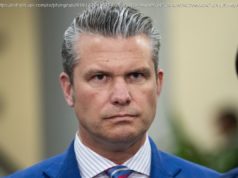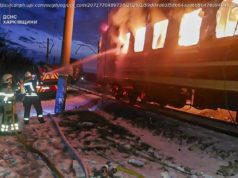WASHINGTON — A North Korean nuclear test — labeled by experts as the pariah state’s most powerful ever — drew rebuke from around the globe, including from North Korea’s strongest ally, with several nations joining forces to come up with an appropriate response.
North Korea’s regime has „succeeded in making a more developed nuke, “ according to state news agency KCNA. During a visit to the country’s Nuclear Weapons Institute „he watched an H-bomb to be loaded into new ICBM, “ KCNA added.
WASHINGTON — A North Korean nuclear test — labeled by experts as the pariah state’s most powerful ever — drew rebuke from around the globe, including from North Korea’s strongest ally, with several nations joining forces to come up with an appropriate response.
The United States, Japan, France, the United Kingdom and South Korea quickly requested an emergency session of the UN Security Council after the test, which North Korea’s leaders said demonstrated the country was capable of putting an advanced hydrogen bomb atop an intercontinental ballistic missile.
The meeting, now scheduled for Monday at 10 a.m. ET, was announced as UN Secretary-General António Guterres condemned the North Korean test as “profoundly destabilizing for regional security.”
The power of the blast was not immediately clear. While the seismic tremors it created led a Norwegian group to say it was eight times more powerful than the bomb dropped on Hiroshima in 1945, South Korean experts said the yield was less than half the Norwegian group’s estimate.
It’s nearly impossible to verify Pyongyang’s claim that it detonated a hydrogen bomb, experts say, or whether North Korea has the capability to deploy such a weapon on a missile.
Still, the test drew sharp admonitions from several nations, including the United States, which made it clear military action remained among its options.
Sunday’s test — North Korea’s sixth-ever — was 10 times more powerful than its test a year ago, Japanese officials said, and North Korea claims to have developed projectiles with increasingly frightening ranges. If that is true, North Korea may be a step closer to being able to reach the US mainland with one of its warheads, as it has threatened.
While North Korea has ratcheted up its ballistic missile testing this year, amid an exchange of threatening rhetoric with US President Donald Trump, this marks the isolated nation’s first nuclear test of Trump’s presidency.
Trump tweeted that he was meeting with military leaders about North Korea, while also entertaining nonmilitary options, such as “stopping all trade with any country doing business with North Korea.” That’s a relatively short list topped by China, the hermit kingdom’s No. 1 ally, and to a lesser degree, India and Russia, according to the Observatory of Economic Complexity.
In other tweets, Trump said China “is trying to help but with little success, ” and “South Korea is finding, as I have told them, that their talk of appeasement with North Korea will not work, they only understand one thing!”
Defense Secretary James Mattis said Sunday that any North Korean threats toward the US or its territories or allies — specifically Guam, Japan and South Korea — would be met with an “effective and overwhelming” response. He further urged leader Kim Jong Un to “take heed of the United Nation’s Security Council unified voice.”
“All members unanimously agreed on the threat North Korea poses and they remain unanimous in their commitment to the denuclearization of the Korean Peninsula because we are not looking to the total annihilation of a country, namely North Korea, but as I said, we have many options to do so, ” Mattis said.
Asked by a reporter Sunday whether the US would attack North Korea, Trump responded: “We’ ll see.”
North Korea’s test came hours after state-run media released images of leader Kim Jong Un inspecting what it said was a hydrogen bomb ready to top an ICBM, which the country would need to deliver a nuclear warhead to far-away locations.
State news anchor Ri Chun Hee hailed the test as a “perfect success” and the final step in attaining a “state nuclear force.”
The device was about eight times more powerful than the nuclear bomb dropped on Hiroshima in 1945, according to NORSAR, a Norway-based group that monitors nuclear tests.
Based on the tremors following the test, NORSAR estimated it had an explosive yield of 120 kilotons. Hiroshima’s had 15 kilotons.
South Korean officials gave a more modest estimate of 50 kilotons.
Whatever the yield, the device was powerful, and the test offers the first hint that North Korea could be more developed in its nuclear program than previously thought.
The country has for years worked on nuclear miniaturization so that it can create a warhead small enough to be fired long distances.
In addition to drawing White House and UN Security Council condemnation, North Korea’s test also upset many of its neighbors.
A text message to reporters from South Korean President Moon Jae-in’s office said the republic was working with the international community to “ensure maximum sanctions and pressures against North Korea’s continued provocations.” It added that the US and South Korea “agree on using sanctions and pressures to have North Korea come to the table for talks.”
The text message concluded, “Korea is a country that has experienced war.… We can’ t let this experience be repeated again on this land. We will pursue the denuclearization of the Korean peninsula through peace with our allies.”
Japanese Prime Minister Shinzo Abe said he spoke with Trump and Russian President Vladimir Putin on Sunday about North Korea’s “reckless act.”
Abe said the US and Japan “stand together 100 percent.” He plans to meet with Putin in Vladivostok, Russia, and the two “have completely agreed to have a close coordination, ” Abe told reporters.
Abe demanded “unprecedented strong pressure” on North Korea and said stopping its hostile actions “depends on the solidarity and coordination with the international community.”
In a high-level national security meeting, Moon called the test “an absurd strategic mistake” that would lead Pyongyang to further isolation.
Sanctions designed to isolate the country have in many ways failed. The Kim regime has developed its weapons and nuclear program despite measures that have crippled the economy and exacerbated periods of mass starvation.
The White House, meanwhile, has been accused of sending mixed messages on the issue and lacking a clear strategy.
Trump’s administration is now pursuing what it calls a strategy of “peaceful pressure” to get North Korea to bring its nuclear weapons program to the negotiating table. But the President’s tweets regularly suggest he is not interested in dialogue.
Treasury Secretary Steven Mnuchin said Sunday he is drafting tough sanctions against North Korea, saying, “This isn’ t the time for just talk.
Start
United States
USA — Political North Korea nuclear test spurs emergency Security Council session






